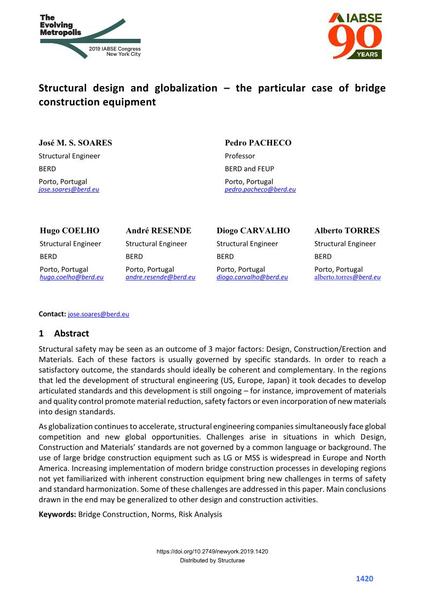Structural design and globalization – the particular case of bridge construction equipment

|
|
|||||||||||
Bibliografische Angaben
| Autor(en): |
José M. S. Soares
(BERD)
Pedro Pacheco (BERD; FEUP) Hugo Coelho (BERD) André Resende (BERD) Diogo Carvalho (BERD) Alberto Torres (BERD) |
||||
|---|---|---|---|---|---|
| Medium: | Tagungsbeitrag | ||||
| Sprache(n): | Englisch | ||||
| Tagung: | IABSE Congress: The Evolving Metropolis, New York, NY, USA, 4-6 September 2019 | ||||
| Veröffentlicht in: | The Evolving Metropolis | ||||
|
|||||
| Seite(n): | 1420-1427 | ||||
| Anzahl der Seiten (im PDF): | 8 | ||||
| DOI: | 10.2749/newyork.2019.1420 | ||||
| Abstrakt: |
Structural safety may be seen as an outcome of 3 major factors: Design, Construction/Erection and Materials. Each of these factors is usually governed by specific standards. In order to reach a satisfactory outcome, the standards should ideally be coherent and complementary. In the regions that led the development of structural engineering (US, Europe, Japan) it took decades to develop articulated standards and this development is still ongoing – for instance, improvement of materials and quality control promote material reduction, safety factors or even incorporation of new materials into design standards. As globalization continues to accelerate, structural engineering companies simultaneously face global competition and new global opportunities. Challenges arise in situations in which Design, Construction and Materials’ standards are not governed by a common language or background. The use of large bridge construction equipment such as LG or MSS is widespread in Europe and North America. Increasing implementation of modern bridge construction processes in developing regions not yet familiarized with inherent construction equipment bring new challenges in terms of safety and standard harmonization. Some of these challenges are addressed in this paper. Main conclusions drawn in the end may be generalized to other design and construction activities. |
||||
| Stichwörter: |
Brückenbau
|
||||
